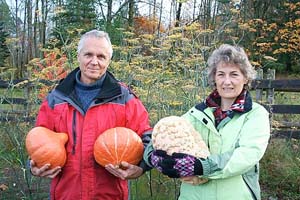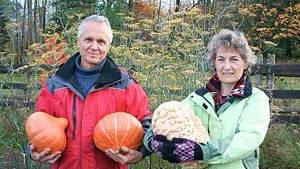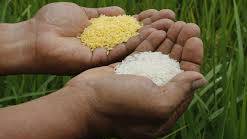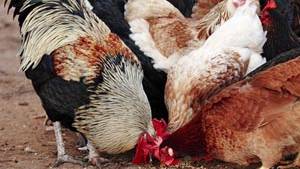Former GMO Engineer Drops Biotech and Goes Organic
Source: organicconnectmag.com
The “conversion” of former anti-GMO activist Mark Lynas to GMO promoter has garnered huge media attention, but Thierry Vrain, Ph.D., a former genetic engineer who speaks out against the risks of genetically engineered foods, has far more credibility—and a far more important story to tell the public. Thierry Vrain’s career has spanned the full range of agriculture—from being a proponent of “chemical” agriculture and genetic engineering to being an advocate for organic farming and an opponent of GMOs. [Vrain, left, and Chanchal Cabrera]
Thierry Vrain’s career has spanned the full range of agriculture—from being a proponent of “chemical” agriculture and genetic engineering to being an advocate for organic farming and an opponent of GMOs. [Vrain, left, and Chanchal Cabrera]A native of France, Vrain earned an undergraduate degree in plant physiology from the Université de Caen and a doctoral degree from North Carolina State University. After moving to Canada he taught plant physiology at Université du Québec in Montréal. Then he worked for 30 years as a research scientist for the Canadian government in Québec and British Columbia where he conducted research on genetically modified potatoes, among other projects. He was director of the biotechnology department at the Pacific Agri-Food Research Centre in Summerland, BC.
After 35 years of research and teaching of soil and molecular biology, Vrain retired to a small farm in Courtenay, BC called Innisfree. Today, Thierry Vrain is a gardener, a teacher, and a passionate speaker about organic gardening—from soil health to GMOs.
Ken Roseboro: Tell me a little more about your background.
Thierry Vrain: I worked in three research institutes in Montreal, Vancouver, and Summerland. I was the head of a research group using molecular biology tools. We worked on food crops. I was genetically engineering small fruit and potatoes for nematode resistance using the snowdrop lectin gene.
The genetically engineered apple (now under regulatory review in the US and Canada) originated in our group though I wasn’t involved with the research.
KR: Did you speak publicly in favor of genetic engineering when you were at Agriculture Canada?
Vrain: Yes, I just took it on as my job. I explained the safety of the technology to the public and did a good amount of lecturing, educating small groups.
KR: What led you to change from a supporter of genetically modified foods to an opponent?
Vrain: I have some difficulties with how the controversy is handled. If you aren’t a scientist you don’t understand the science. If you are a scientist and discover things that are of concern, then you are accused of doing “pseudoscience” and often viciously attacked by the industry and academics on the payroll. This has happened many times, for example to Arpad Pusztai in England and then Ignacio Chapela, who discovered GMO contamination in native corn in Mexico. He was attacked and almost fired from his post at the University of California. A year later his findings were confirmed.
There are now quite a number of research publications, in peer reviewed journals, showing concerns from feeding GM corn and soy to rats. Those studies are ignored and shouldn’t be. Federal agencies should repeat the studies and must test these crops for safety.
Research scientists from the US Food & Drug Administration made it clear in the early 1990s that there could be indirect effects from eating GM crops, such as toxins, allergens, and nutritional deficiencies. Those warnings were ignored. Now a good number of publications are confirming the predictions of the FDA scientists.
It troubles me that money and the bottom line are at the root of the use of the technology.
KR: You say that the science behind genetic engineering is based on a misunderstanding. Please elaborate on this.
Vrain: When we started with genetic engineering in the 1980s, the science was based on the theory that one gene produces one protein. But we now know, since the human genome project, that a gene can create more than one protein. The insertion of genes in the genome through genetic engineering interrupts the coding sequence of the DNA, creating truncated, rogue proteins, which can cause unintended effects. It’s an invasive technology.
Biotech companies ignore these rogue proteins; they say they are background noise. But we should pay attention to them. It must be verified that they produce no negative effects.
A key point is that the concern about genetic engineering should be about the proteins. Many plants and animals are not edible because their proteins are toxic or poisonous. To test for the safety of Bt crops, scientists have mostly fed the pure protein to rats, and there may be no problem. But it’s different if you feed rats the whole GM plant because they are getting these rogue proteins that could cause harm.
[...]
Read the full article at: organicconnectmag.com























